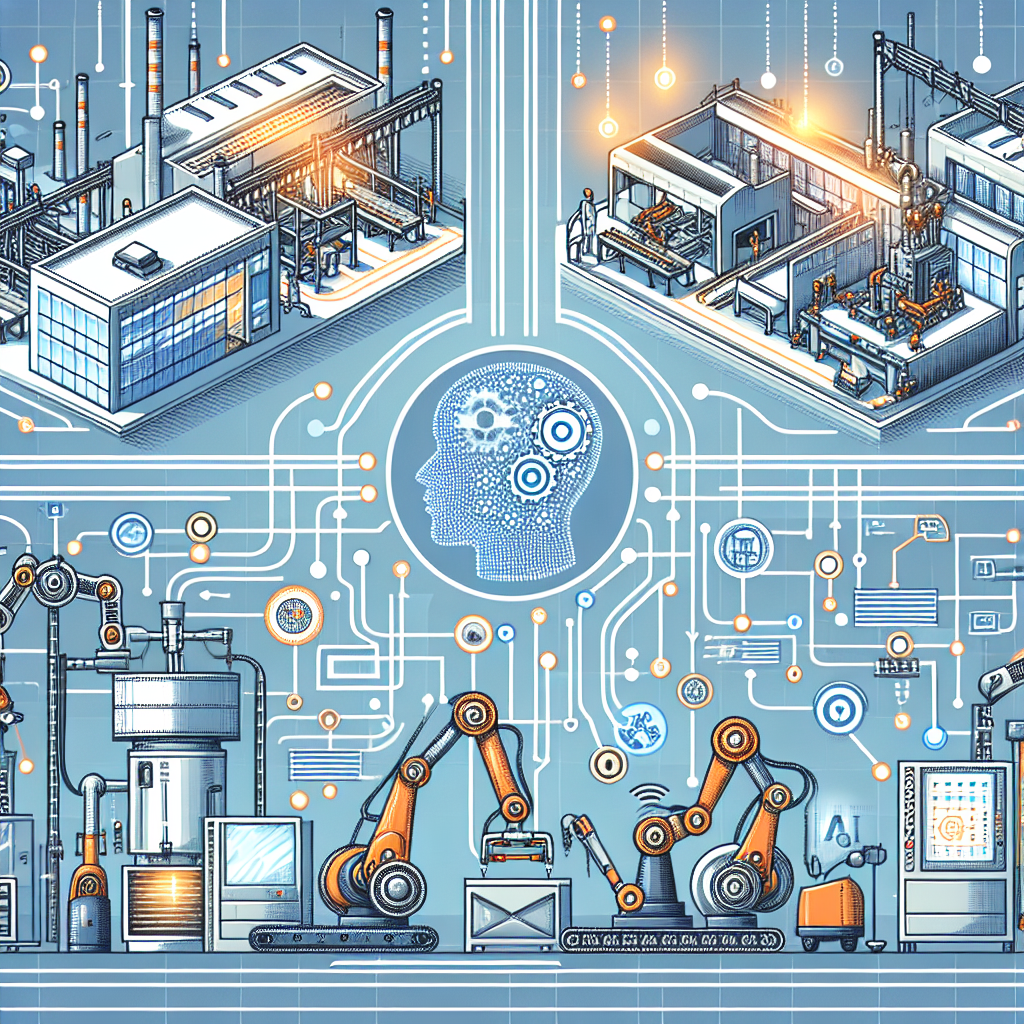In recent years, the manufacturing industry has been undergoing a significant transformation with the adoption of Industry 4.0 principles. Industry 4.0, also known as the fourth industrial revolution, is characterized by the integration of digital technologies, automation, and data exchange in manufacturing processes. One of the key technologies driving this transformation is Artificial Intelligence (AI). AI has the potential to revolutionize manufacturing by optimizing production processes, improving quality control, and enabling predictive maintenance. In this article, we will explore the benefits of implementing AI in Industry 4.0 manufacturing and address some common questions about this technology.
Benefits of Implementing AI in Industry 4.0 Manufacturing:
1. Improved Efficiency and Productivity:
AI can automate repetitive and time-consuming tasks, freeing up human workers to focus on more strategic and creative activities. By analyzing vast amounts of data in real-time, AI can optimize production processes, reduce downtime, and increase overall efficiency. This results in higher productivity levels and improved operational performance.
2. Enhanced Quality Control:
AI-powered systems can detect defects and anomalies in products with a high degree of accuracy. By using machine learning algorithms, AI can learn from past data to identify patterns and deviations in production processes. This helps manufacturers to maintain consistent product quality and reduce the risk of defects or errors.
3. Predictive Maintenance:
AI can enable predictive maintenance by analyzing equipment data to anticipate potential failures before they occur. By monitoring equipment performance in real-time, AI can detect early warning signs of malfunction and schedule maintenance activities proactively. This helps to reduce downtime, minimize costs, and extend the lifespan of machinery.
4. Supply Chain Optimization:
AI can optimize supply chain operations by analyzing data from various sources to predict demand, optimize inventory levels, and improve logistics efficiency. By providing real-time insights and recommendations, AI can help manufacturers to make better decisions and respond quickly to changing market conditions.
5. Customized Production:
AI can enable mass customization by analyzing customer preferences and production data to create personalized products at scale. By using AI algorithms, manufacturers can tailor products to individual customer needs while maintaining cost-effective production processes. This allows companies to differentiate themselves in the market and meet the growing demand for customized products.
Common Questions About Implementing AI in Industry 4.0 Manufacturing:
1. What is the role of AI in Industry 4.0 manufacturing?
AI plays a critical role in Industry 4.0 manufacturing by enabling automation, predictive analytics, and optimization of production processes. AI-powered systems can analyze vast amounts of data in real-time to improve efficiency, quality control, and decision-making in manufacturing operations.
2. How can AI improve efficiency in manufacturing?
AI can improve efficiency in manufacturing by automating repetitive tasks, optimizing production processes, and enabling predictive maintenance. By analyzing data from sensors and equipment, AI can identify opportunities for optimization and reduce waste in the production chain.
3. What are the challenges of implementing AI in manufacturing?
Some of the challenges of implementing AI in manufacturing include data security concerns, integration with existing systems, and the need for skilled AI professionals. Companies need to invest in data infrastructure, training programs, and partnerships with AI vendors to successfully implement AI in their manufacturing operations.
4. How can manufacturers overcome resistance to AI adoption?
Manufacturers can overcome resistance to AI adoption by educating employees about the benefits of AI, providing training programs to upskill workers, and involving employees in the implementation process. By fostering a culture of innovation and collaboration, companies can create a positive environment for AI adoption in manufacturing.
5. What are the potential risks of AI in manufacturing?
Some potential risks of AI in manufacturing include job displacement, data privacy concerns, and algorithm bias. Companies need to address these risks by implementing ethical AI practices, ensuring transparency in decision-making processes, and providing support for workers affected by automation.
In conclusion, AI has the potential to transform the manufacturing industry by improving efficiency, quality control, and decision-making in production processes. By implementing AI in Industry 4.0 manufacturing, companies can optimize operations, reduce costs, and gain a competitive edge in the market. However, it is important for manufacturers to address the challenges and risks of AI adoption to ensure a successful implementation. By investing in the right technology, talent, and strategies, companies can harness the full potential of AI in manufacturing and drive innovation in the industry.

